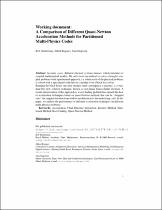 ResearchSpace
ResearchSpace
A comparison of different quasi-newton acceleration methods for partitioned multi-physics codes
JavaScript is disabled for your browser. Some features of this site may not work without it.
- ResearchSpace
- →
- Research Publications/Outputs
- →
- Book Chapters
- →
- View Item
| dc.contributor.author |
Haelterman, R

|
|
| dc.contributor.author |
Bogaers, Alfred EJ

|
|
| dc.contributor.author |
Degroote, J

|
|
| dc.date.accessioned | 2018-02-26T13:07:31Z | |
| dc.date.available | 2018-02-26T13:07:31Z | |
| dc.date.issued | 2018-02 | |
| dc.identifier.citation | Haelterman, R., Bogaers, A.E.J. and Degroote, J. 2018. A comparison of different quasi-newton acceleration methods for partitioned multi-physics codes. Transactions on Engineering Technologies: 135-152 | en_US |
| dc.identifier.isbn | 978-981-10-7487-5 | |
| dc.identifier.uri | https://link.springer.com/chapter/10.1007/978-981-10-7488-2_11 | |
| dc.identifier.uri | https://doi.org/10.1007/978-981-10-7488-2_11 | |
| dc.identifier.uri | http://hdl.handle.net/10204/10058 | |
| dc.description | Copyright: 2017 Springer. This is the accepted version of the paper. The published version can be obtained from the publisher's website. | en_US |
| dc.description.abstract | In many cases, different physical systems interact, which translates to coupled mathematical models. We only focus on methods to solve (strongly) coupled problems with a partitioned approach, i.e. where each of the physical problems is solved with a specialized code that we consider to be a black box solver. Running the black boxes one after another, until convergence is reached, is a standard but slow solution technique, known as non-linear Gauss-Seidel iteration. A recent interpretation of this approach as a root-finding problem has opened the door to acceleration techniques based on Quasi-Newton methods that can be “strapped onto” the original iteration loop without modification to the underlying code. In this paper, we analyze the performance of different acceleration techniques on different multi-physics problems. | en_US |
| dc.language.iso | en | en_US |
| dc.publisher | Springer | en_US |
| dc.relation.ispartofseries | Worklist;20305 | |
| dc.subject | Acceleration | en_US |
| dc.subject | Fluid-structure interaction | en_US |
| dc.subject | Iterative method | en_US |
| dc.subject | Partitioned method | en_US |
| dc.subject | Root-finding | en_US |
| dc.subject | Quasi-Newton method | en_US |
| dc.title | A comparison of different quasi-newton acceleration methods for partitioned multi-physics codes | en_US |
| dc.type | Book Chapter | en_US |
| dc.identifier.apacitation | Haelterman, R., Bogaers, A. E., & Degroote, J. (2018). A comparison of different quasi-Newton acceleration methods for partitioned multi-Physics codes., <i>Worklist;20305</i> Springer. http://hdl.handle.net/10204/10058 | en_ZA |
| dc.identifier.chicagocitation | Haelterman, R, Alfred EJ Bogaers, and J Degroote. "A comparison of different quasi-newton acceleration methods for partitioned multi-physics codes" In <i>WORKLIST;20305</i>, n.p.: Springer. 2018. http://hdl.handle.net/10204/10058. | en_ZA |
| dc.identifier.vancouvercitation | Haelterman R, Bogaers AE, Degroote J. A comparison of different quasi-newton acceleration methods for partitioned multi-physics codes.. Worklist;20305. [place unknown]: Springer; 2018. [cited yyyy month dd]. http://hdl.handle.net/10204/10058. | en_ZA |
| dc.identifier.ris | TY - Book Chapter AU - Haelterman, R AU - Bogaers, Alfred EJ AU - Degroote, J AB - In many cases, different physical systems interact, which translates to coupled mathematical models. We only focus on methods to solve (strongly) coupled problems with a partitioned approach, i.e. where each of the physical problems is solved with a specialized code that we consider to be a black box solver. Running the black boxes one after another, until convergence is reached, is a standard but slow solution technique, known as non-linear Gauss-Seidel iteration. A recent interpretation of this approach as a root-finding problem has opened the door to acceleration techniques based on Quasi-Newton methods that can be “strapped onto” the original iteration loop without modification to the underlying code. In this paper, we analyze the performance of different acceleration techniques on different multi-physics problems. DA - 2018-02 DB - ResearchSpace DP - CSIR KW - Acceleration KW - Fluid-structure interaction KW - Iterative method KW - Partitioned method KW - Root-finding KW - Quasi-Newton method LK - https://researchspace.csir.co.za PY - 2018 SM - 978-981-10-7487-5 T1 - A comparison of different quasi-newton acceleration methods for partitioned multi-physics codes TI - A comparison of different quasi-newton acceleration methods for partitioned multi-physics codes UR - http://hdl.handle.net/10204/10058 ER - | en_ZA |





